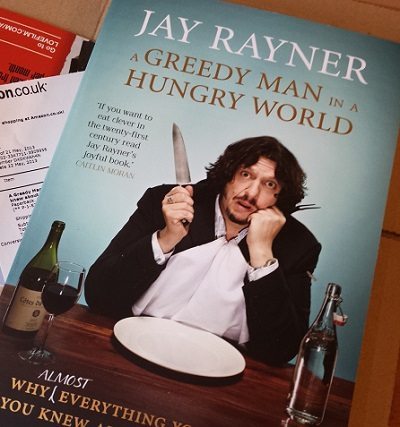Review: ‘A greedy man in a hungry world’ by Jay Rayner

Here’s a thing: that Jay Rayner, yes, him off the telly, the scary one who can close a restaurant with a swish of his pen? He’s actually really nice. I’ve chatted a bit with him recently about his new book, and he actually cares what I think. He cares about food: not just posh restaurant food, but the everyday stuff that goes in our trolley. He doesn’t eat foie gras for breakfast. Who knew?
This book is probably the hardest I’ve ever read. I read it twice (sorry, Jay, I lied when I said I wasn’t finished), not because it’s full of big, complicated words or anything, no, it’s actually very funny and incredibly entertaining (wait ‘til you get to the big wooden willy bit). Jay - I feel like we’re on first name terms now - is self-deprecating (almost cringingly so on occasion) and honest and it’s very interesting. It’s just hard because there are facts in it that made me question everything I currently believe about food, how I buy my food and where it comes from.
The book will take you on a journey from 1960s Kenton (where people like his mother spent half a day a week and probably a third of the family’s weekly income food shopping), through heart-breaking Rwanda, where children are starving in a fertile, but overpopulated land, to today’s supermarkets where 1 or 2p added to the price (and less BOGOFF deals) could make a massive difference to this country’s farmers. It will introduce you to terms such as ‘sustainable intensification’, ‘virtual hectares’ and ‘gastronomics’, and make you really scratch your head over GM foods and food miles.
This book is basically about feeding a burgeoning population. It’s about why sometimes, buying local isn’t, environmentally and economically, always the best option, and about why farming on a huge scale can be a good thing. This, of course, has upset everyone who believes that small-scale and local is best and I understand that, I really do. But (to totally oversimplify things) take Jay’s example of potatoes. In Norfolk, with its peat-rich, loose soil, farmers can yield about 20 tonnes of potatoes per acre. But in London, with its hard, clay soil, they’d get more like 16 tonnes an acre. So in order to match Norfolk, London farmers would need much more fertiliser, or more land, or something. And all of this would impact on the carbon footprint of those potatoes. This, I understand.
I learned so much too. I know that China is buying up vast tranches of agricultural land in Africa to safeguard their future, and that biofuels are really, really bad. I know that in Britain we slaughter between 150,000 and 160,000 pigs a week (oh, the slaughterhouse bit, just… bloody hell) and why farmers’ markets, whilst I love them, will only ever be a luxury.
The trouble is, there are several quite complicated elements of the story to understand here, and I’m just not sure I have the mental capacity to understand them all (and no, I’m not participating in any foolish Silly Me Syndrome ‘gosh I’m blonde I am’ thing here, I just honestly believe that some of it went over my head).
I’ve made decisions after reading this book. I’ve resolved to buy only what I need, avoid BOGOFFs like the plague, to cut down on my meat purchases and to pay proper prices for things like milk. After I’d finished the book, I tried to explain it to my husband. But like all immensely clever writers, Rayner is practically un précis-able (yes it’s a real word because I said so). Which is a good thing, because if you care about food, and about how we’re going to carry on feeding ourselves, our children, and their children, the one thing you absolutely must do is read this book for yourself.




Very good review think I really need to read this book xx
Thanks Barbara. Well I’m biased but I think everyone should. It taught me loads x
Great review! I hadn’t heard of the book before but really want to read it now. I like Jay Rainer and I am v conscious that sometimes what we think is right and true about food is actually down to clever marketing. I often get confused in shops about what’s ‘good’ and what’s not so hopefully this will help.
I think that’s very true. This will definitely explode some myths and make you think differently.
Thanks Becky… Great review and both you and Jay Rainer (not on first name terms yet) have inspired me. It’s given me some real “food for thought” on what I buy and where I buy. Will definitely read his book x
Hey Nikki, thank you very much. Yes do buy it - it’s made me a much more thoughtful shopper (and indeed eater).
Ooh, sounds like a must read. Definitely one for my book wish list x
It really is. I laboured over it but was determined to do it justice. Plus, I balked at admitting that some of it is complex, but then Charlie persuaded me by saying ‘there’s no shame in saying that something is complicated’. Well, quite. x
This is on my to-be-read pile for this month. I really like Jay Rayner’s writing and his uncompromising approach, which makes people think. I’ve been giggling at your exchanges this week on Twitter. One thing I’ve learned from talking to writers is it doesn’t matter HOW famous they are, they want to know what people think about their work. Especially fab food bloggers like wot you are, my clever chum. x
I love his writing. And I admire his ‘I don’t give a shit what you think, this is what I think’ approach. We could all do with a bit more of that 🙂 And thank you, I’m glad that’s true x
I think I need to read this, I am constantly fretting about the amount of money I spend on food (which I think is modest compared to some) but I would like to be more mindful of what I’m buying. Thanks for the review xx
I spend a fortune on food, Jean - my teenagers are like a plague of locusts in the kitchen. Definitely worth reading just to nudge you in the right direction when you’re shopping though - it’s changed my views on lots of things.
Great review Becky. I am about a third of the way in to this book and it’s a real eye opener. I was so shocked by the plums alone so can’t imagine what more is to come. Definite must read. And there is something about the way that Jay Rayner writes that makes it non-preachy and very readable.
Thank you. I know, the plums! I won’t spoil it for you by saying any more, but can’t wait to compare notes when you’ve finished x
Hey, it certainly sounds like quite a read. Not was I was expecting to hear in terms of the content and I mean that in a good way. Thanks for the heads up :0)
I agree - and I think the Caitlin Moran quote on the front is misleading as I don’t think it’s really ‘joyful’ as such, just eye opening x
I really want to read this, the excerpt articles in The Observer were really interesting.
And they only tell half the story, Erica. It’s fascinating, I highly recommend it, especially with your interest in food x